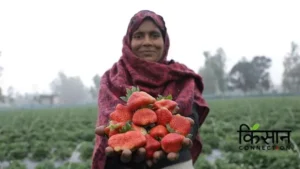Madhya Pradesh
The pandemic and the consequent lockdowns, last year and this year, have forced many farmers in Anuppur district, Madhya Pradesh, to turn to traditional wheat farming, which they say is less high maintenance.
“I planted tomatoes on three acres of land for the Rabi season last year and spent nearly sixty five thousand rupees to do so,” Mahesh Prasad Nagesh, a 35-year-old farmer from Basantpur village, in Anuppur district, Madhya Pradesh, told Gaon Connection. When the government declared lockdown at the start of April this year, my tomato crops were in good shape. I was expecting at least three to four lakh rupees from my produce. But there was no way to transport the tomatoes to sell them and the entire crop rotted in the field,” he lamented.
Nagesh’s lands lie on the Narmada river’s basin. Anuppur district is located 546 kilometres from Bhopal, and borders the neighbouring state of Chhattisgarh.
Also Read: The tihaiya farmers of Vindhya region caught in a cycle of debt and destitution
Sturdy and low maintenance Gajdi
This year, for the rabi season, Nagesh has chosen to cultivate Gajdi wheat on his three acres of land. “I chose the Gajdi variety of wheat because it requires very little care. Even if there is another lockdown, I will have enough produce to feed my family.”
Nagesh said that he refused to grow tomatoes again.
“Around ten to fifteen farmers from my village who also cultivated tomatoes over an area of nearly two hundred acres, have all stopped growing tomatoes this year. Those who have suffered loss before are not ready to bear it again,” Nagesh said. “Of them I know of at least five or six farmers who have shifted to Gajdi cultivation,” he said.
The Watershed Organisation Trust (WOTR), a non-profit, provided Gajdi varieties of seeds to farmers in Madhya Pradesh to help them adapt to climate change. WOTR was established in Pune in 1993. Among its goals are the development of poor families, restoration of ecosystems, climate-resilient agriculture, efficient and integrated water management, and adaptation to climate change. The nonprofit aims to build the resilience of farmers, women, and the most vulnerable communities. In Anuppur, WOTR provides assistance to 70-80 farmers in Basantpur, Durva Tola, Kanchanpur, Deori, and Dubsara villages.
Also Read: Debt-ridden melon farmers in Satna fall through the cracks; govt has no record of such cultivators
Mahesh once grew the Sujata variety of wheat. According to him a quintal of seed he would get an yield of nearly 42 quintals of grain. But the Sujata variety of wheat took up to 140 days to ripen while the Gajdi variety of wheat takes only 90 to 110 days to be ready to harvest.
According to a WOTR official who did not want to be named, Gajdi is a reddish-brown grain that was particularly suited to drought-prone regions as it required less water to cultivate. But the downside to the Gajdi wheat, he pointed out, was that it fetched a lower price in the market when compared to the other wheat varieties, and was vulnerable to wilting diseases.
“Gajdi is an indigenous variety of wheat that was common in Anuppur and nearby areas ten to fifteen years ago. The variety does not require irrigation and can be grown in moisture left in the soil after the paddy crops are harvested,” he told Gaon Connection.
Although the Narmada river is the major irrigation source in Basantpur village, despite the abundance of water, many farmers fail to irrigate their fields. “ The irregular supply of electricity makes it difficult to irrigate the field,” Nagesh explained.
Taking tomatoes off the field
Farmer Ajay Kumar, from Basantpur village also gave up on tomatoes. The 32-year-old had sowed tomatoes in one acre of land last year. “I have been sowing tomatoes for the last three years,” Ajay Kumar told Gaon Connection. He said he even made a profit when he transported his produce to Korba district to sell. “I make up to one and a half lakh rupees in profit every year. But, during the second lockdown, no trucks from Korba came to pick up my produce. Our products were not even sold in Anuppur,” he recalled. He said he did not even earn back Rs 20,000 that he had invested in the tomato crop by way of seeds, fertilizer, and labour.
Ajay Kumar feared another lockdown with the third wave of the COVID 19 pandemic, and therefore decided on growing Gajdi wheat.
Also Read: Madhya Pradesh: Farmers’ hopes to recover from losses dashed as infestation destroys paddy crop
Many farmers giving up cash crops
“Farmers are giving up cash crops because they are already in debt due to the lockdown. Wheat, pulses, and gram require much less input and can be harvested and stored at home,” Sharad Tiwari, professor at Jawaharlal Nehru Krishi Vishwa Vidyalaya in Jabalpur, told Gaon Connection. “During the lockdown, cash-crop farmers failed to send their crops to mandis on time. Tomatoes must be transported or put in cold storage as soon as they ripen otherwise they are useless,” he explained. Moreover, he added, crops like tomatoes, cotton, etc., were an expensive investment.
“Traditional varieties such as the Gajdi, may prove useful in drought-prone areas as they require less water to grow. That is why farmers prefer them,” corroborated SK Pandey, dean, College of Agriculture, Rewa.
Madhya Pradesh’s productivity is lower than that of Punjab. According to a report by the Reserve Bank of India released in 2020, the wheat productivity in Punjab in 2018-19 was 51.88 quintals per acre, while in Madhya Pradesh it was around 18.47 quintals per acre. Another report from the Centre for Monitoring Indian Economy (CMIE), revealed that Madhya Pradesh procured 129 lakh tonnes of wheat from farmers in 2020-21, the highest in the country, while Punjab procured marginally less at 127.6 lakh tonnes of wheat from its farmers.



















